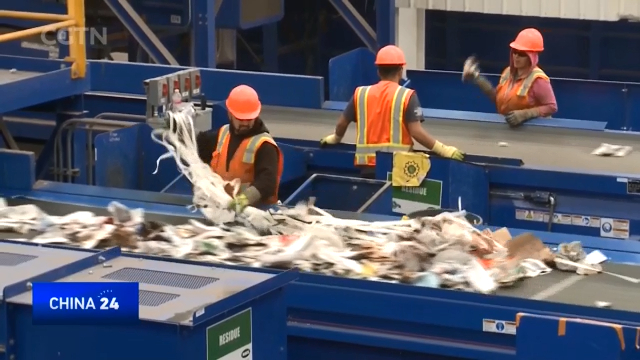
21:46, 15-Jul-2018
China Trash Ban Hits US: Throwing out old ways of waste management
Updated
21:39, 18-Jul-2018
03:17

As part of its "National Sword" policy announced last year, China has drastically limited what type of foreign recycled waste it would accept. The change has put a large burden on local US waste management, but some say it's a chance to force America to come to grips with its own problem. Mark Niu has the story.
In California's Monterey County, workers at this material recoveries facility are busier than ever. Director of Operations Tim Brownell says in recent years, 30-percent of all waste paper and 60-percent of all plastics recovered in the United States were shipped to China. But he says China's new policies only allow for accepting cardboard and newspaper, and number one and two plastics - but only if they don't contain more than half a percent of contamination.
MARK NIU MONTEREY COUNTY, CALIFORNIA "But that's an extremely difficult standard to meet. In fact, director of operations Brownell says they've only been able to ship recycled cardboard to China since those rules went into effect. He says across the country only a handful of operations have been able to ship any recycled waste to China."
TIM BROWNELL, DIRECTOR OF OPERATIONS MONTEREY REGIONAL WASTE "The problem has also been mixed up with some of the rhetoric and trade war issues that we're seeing in a broader context. And so in the month of May, China actually stopped, put an embargo and stopped accepting for 30 days any recyclable material at all from the United States. We have not resumed shipping anything to them."
You might think Brownell would have harsh words for China. He doesn't.
TIM BROWNELL, DIRECTOR OF OPERATIONS MONTEREY REGIONAL WASTE "We were just trying to move volume through the system and not creating the best product to make new materials from. And China was suffering the consequences, up to 30% of what was being shipped to them was not recyclable."
But it's a difficult transition for the US to deal with massive amounts of waste, such as plastic film that can jam machines here. And there's currently no market for it in the US. This film comes from one of America's largest bagged salad producers, Taylor Farms.
BRUCE TAYLOR, FOUNDER & CEO TAYLOR FARMS "It's critical to our business right now, because the plastic we use right now let oxygen come into that bag at a controlled rate to keep that lettuce breathing and expiring. We're looking at plastics that are biodegradable or that have maybe a one year life and then they just sort of dissolve. That's another area of innovation and opportunity that is tremendous."
BRUCE OLSZEWSKI, DIRECTOR CENTER FOR DEVELOPMENT OF RECYCLING SAN JOSE STATE UNIVERSITY "People in the industry knew that we were reliant on the health of Chinese markets. Yet despite having all that time, more like 30 years, we've had time to develop markets here in the US. There was no action."
San Jose State University lecturer Bruce Olszewski says it's up to government to help develop new markets and for industry to respond.
BRUCE OLSZEWSKI, DIRECTOR CENTER FOR DEVELOPMENT OF RECYCLING SAN JOSE STATE UNIVERSITY "The solution is to make industry responsible for the materials that they create. So if industry can work to close open loops, they will create more jobs, they will reduce pollutants."
Despite the pressure the US waste disposal system is under, Olszewski says there's no better opportunity for innovators to help design new tech and new market conditions for the benefit of future generations. Mark Niu, CGTN, Monterey County, California.

SITEMAP
Copyright © 2018 CGTN. Beijing ICP prepared NO.16065310-3
Copyright © 2018 CGTN. Beijing ICP prepared NO.16065310-3